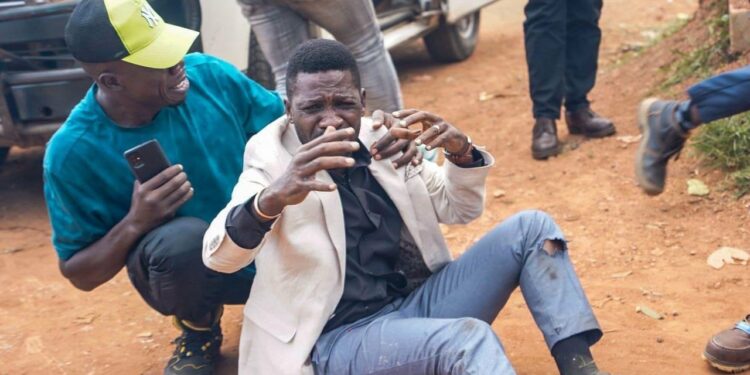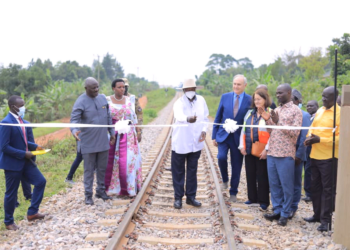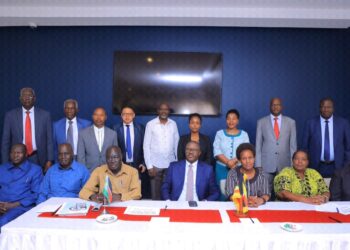Six days ago, a chaotic scene unfolded when opposition leader Robert Kyagulanyi, popularly known as Bobi Wine, was struck by fragments of a tear gas canister at Bulindo during a confrontation when security officers attempted to block Bobi Wine and his team from marching down a road, resulting in an altercation in which he was injured.
Initially, the injury was widely believed to be from a gunshot, a claim echoed by credible international media outlets. However, it was soon clarified to be caused by fragments of a tear gas canister. Despite the correction, this did little to stem the tide of mockery that followed, exposing the deep-seated animosities entrenched within Uganda’s political landscape where the aorta of remorse is far gone!
Social media platforms buzzed with alarm as images of Bobi Wine being assisted by his aides circulated rapidly. For a brief moment, the country stood on edge, concerned about the safety of a man who has become both a symbol of hope for many and a lightning rod of criticism for others.
However, as details emerged, it became clear that Bobi Wine’s injury was not from a bullet, but rather from fragments of a tear gas canister. While the truth was soon clarified, the narrative had already spun out of control, with political factions seizing the moment to further their agendas.
Instead of sympathy, Bobi Wine’s injury became a subject of ridicule from both opposition supporters who saw it as an overreaction, and government loyalists who used the incident to undermine his credibility. A barrage of memes, tweets, and public comments flooded the airwaves, portraying the event as yet another exaggerated claim by a leader known for his dramatic opposition to Gen Yoweri Museveni’s government.
One of the respected political analysts was quoted saying, “This is just another example of the opposition making mountains out of molehills,” dismissing the injury as inconsequential and accusing Bobi Wine of “playing the victim card” to gain international sympathy.
The mockery did not stop there; some went as far as to suggest that Bobi Wine’s response was an attempt to exploit the situation for political mileage. A popular post on social media quipped, “Bobi Wine turned a scratch into a national tragedy.”
The phenomenon of celebrating someone’s misfortune—akin to “dancing on someone else’s grave” for the last 6 days has been on full display. The laughter and derision from both sides of the political divide have exposed a troubling aspect of Uganda’s current socio-political environment: a lack of empathy that cuts across affiliations.
Some Political analysts have argued that the mockery of Bobi Wine’s incident highlights the entrenched divisions within Uganda, where the humanity of opponents is often disregarded in favor of scoring political points. As Bobi Wine lay bandaged, not only was the physical pain of his injury palpable but so too was the symbolic wound of a nation that seemed to take delight in the misfortunes of its own.
“It’s not just about Bobi Wine,” said Dr. Sarah Namakula, a political commentator. “It’s about the state of our politics where empathy is scarce, and the pain of one is viewed as the gain of another. When we start mocking injuries, we are essentially celebrating our downfall as a society.”
Dancing on one’s Grave, a vice that is eating Ugandans slowly
For Bobi Wine, the incident serves as a stark reminder of the volatile political climate in which he operates—a climate where a simple misunderstanding can spiral into a national spectacle, and where empathy is often overshadowed by the thirst for political supremacy.
As Uganda moves forward gearing for the 2026 general elections, such incidents of police brutality call for reflection on the broader implications of political discourse in the country. While Bobi Wine’s injury might heal in time, it has disclosed to us that the deeper wound of societal division remains open, underscored by the public’s reaction to his misfortune.
Ultimately, the episode serves as a sobering reminder that in the world of politics, humanity should never be lost. The real challenge for Uganda lies in moving beyond the instinct to dance on the wounds of others, towards a space where compassion can bridge even the widest of divides.
For the past years, this wound of unremorsefulness among Ugandans had been unfolding but no one has been watching, when former president Apollo Milton Obote died of course he had his fouls but the margin of people who celebrated his death was observed.
Although the sitting government which is still the same saw this, nothing was done not even a move of reconciliation, however for the past ten years now, only a few government dignitaries have died and people don’t celebrate these are; Gen Kasirye Gwanga, former Speaker Jacob Oulanyah though still a few celebrated. Andrew Felix Kaweesa etc.
However, there are those whose deaths have been met with public jubilation, such as the late Gen Elly Tumwine and Brigadier Noble Mayombo. It is essential to note that these celebrations are not universally shared and often reflect deep-seated grievances or a perceived sense of justice among those who suffered under the actions of the deceased. At the same time, such reactions underscore a serious need for peace and dialogue, as Uganda, a nation with diverse ethnic groups, must prioritize unity as a strong vessel for national cohesion.
Do you have a story in your community or an opinion to share with us: Email us at editorial@watchdoguganda.com













